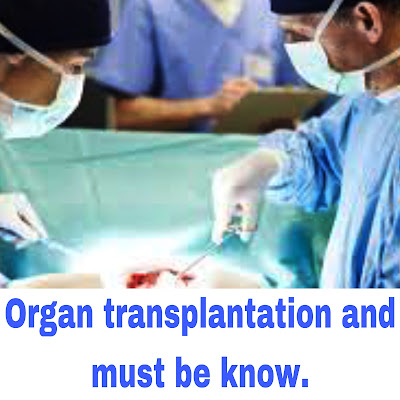Do you know about of organ transplantation.?
Organ transplantation includes eliminating organs from a contributor and relocating them into somebody who might be extremely sick or kicking the bucket from organ disappointment. It can save the existence of the individual who gets the organ.
Sorts of organ and tissue transfers
Organs that can be relocated in Australia incorporate the heart, kidneys, liver, lungs, digestive tract and pancreas. Tissue can likewise be relocated, including heart valves, bone, ligaments, tendons, skin and portions of the eye.
When are organ transfers required?
You might require an organ relocate on the off chance that you have an organ that isn't working any more (end-stage organ disappointment). An organ relocate is generally viewed as after other potential medicines have been attempted. It could be a choice assuming experts figure the transfer can save your life.
A transfer can likewise be utilized to work on somebody's personal satisfaction - for instance, a kidney relocate for an accomplished individual kidney disappointment. Furthermore, a tissue relocate may, for instance, help somebody who has experienced serious consumes to a delicate area of skin, like the face.
Who can give organs and tissue?
Individuals can give organs when they pass on (expired contributor) or they can give a kidney or part of their liver while they are as yet alive (live benefactor). A living benefactor is normally a family member or dear companion of the individual who needs the kidney or liver transfer.
To peruse more about organ or tissue gift or to enroll as a benefactor, visit www.donatelife.org.au.
Significant issues to consider
Whether you have an organ relocate is for you, your family and friends and family, and your medical care group to choose. It is essential to comprehend your condition and the likely advantages and dangers of organ relocate, similarly as with any clinical treatment.
You can figure out more about the different organ transfers here:
Kidney transfers: Kidney Health Australia
Heart transfers: The Heart Foundation [PDF]
Inquiries to pose to your medical services group
To find out about your decisions and what might lie ahead, consider getting some information about the accompanying issues. The responses to these inquiries will be founded on your singular conditions:
How long will I want to sit tight for the organ relocate?
What are the dangers implied in the organ relocate?
What are the advantages?
What are my options in contrast to having a transfer?
What will occur during the technique?
What might I at any point anticipate following the transfer? And half a month to months after the transfer?
What is the recuperation time after the transfer?
What are the potential inconveniences of the transfer?
What amount will the transfer cost?
What post-relocate medicines, including prescriptions, will I want? What amount will they cost?
How long will the relocated organ keep going for? What is my future with a transfer?
healthdirect's inquiry developer is an instrument to assist you with making an inquiry list for your PCP's or alternately expert's arrangement. Go to the Question Builder, set up your rundown, then print or email it so you recollect what you need to inquire.
Influence on your feelings
An organ relocate can influence your body as well as how you feel. Certain individuals experience pressure from conceivable organ dismissal or secondary effects from drugs. Others find it challenging to adjust to their new circumstance.
It might assist with talking with your medical care group about how you feel following the technique. You may likewise need to contact patient care groups to hear from individuals who have additionally had an organ relocate.
Facing everyday life after an organ relocate
On the off chance that you have had an organ relocate, you will presumably have to take drugs and have customary clinical arrangements until the end of your life. Dismissal happens when your body regards the relocated organ as unfamiliar and assaults it. Hostile to dismissal meds work on the invulnerable framework to prevent this from occurring. Notwithstanding, hostile to dismissal medications might bring a higher gamble of incidental effects like disease. You and your medical care group will for the most part have to cooperate to adjust the gamble of organ dismissal with the gamble of aftereffects.
It means a lot to carry on with a sound way of life to assist your relocated organ with enduring as far as might be feasible. This generally incorporates things, for example, eating steadily, not smoking and getting sufficient active work. Your medical services group will presumably offer you explicit guidance on dealing with your relocated organ.





0 Comments
Well come to Health net career.